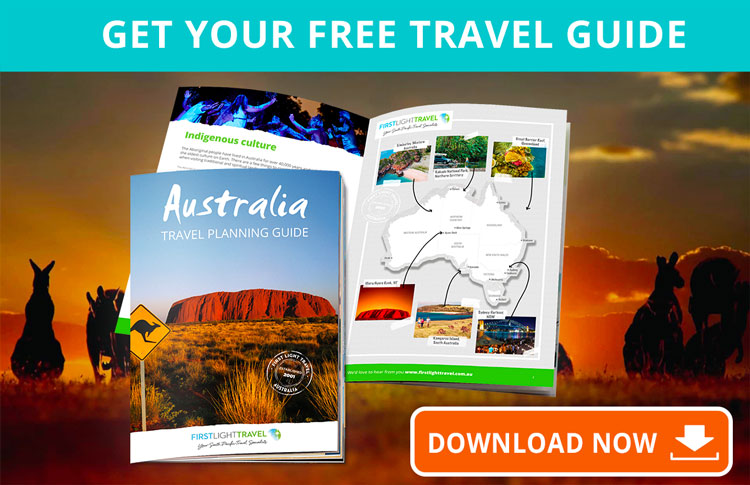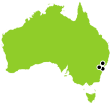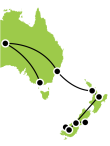
From asthma to hay fever, and from insulin to medical cannabis: here's the lowdown on bringing your prescribed medications, vitamins or herbal remedies on holiday to Australia without any fuss.
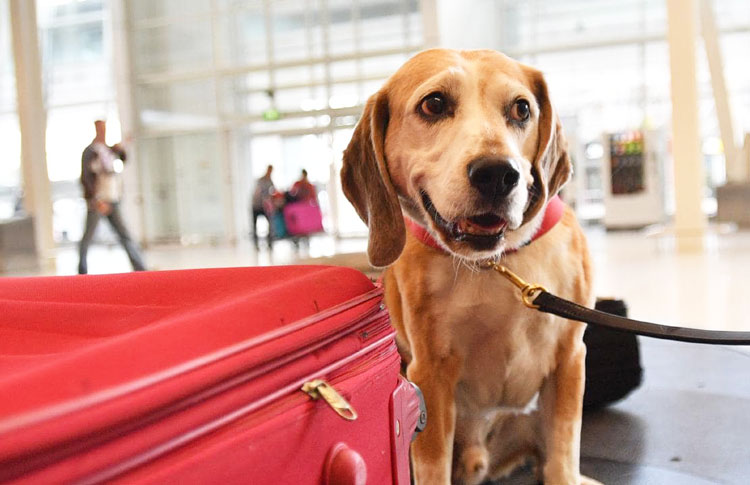
Contents
Bringing medication into Australia
Anybody planning on bringing medication into Australia should be aware of what they can and cannot bring into the country, as well as how to avoid any problems at the airport, even for medications that are allowed in. Luckily, if you follow the required steps, it’s fairly easy and totally stress-free to bring medication into Australia.
What you need to know if bringing medication into Australia:
So, let’s crack on with it and explain the key things to help you breeze through customs on arrival:
1) The Traveller's Exemption – what it is and how it will help you
- You can easily bring most medications to Australia, thanks to something called the traveller's exemption - below you will find out how this will help you.
2) Prescription meds you can and cannot bring to Australia under the Traveller's Exemption
Most common medication types are included in the traveller’s exemption - read on to check yours, and learn what to do if it isn't listed.
3) Travel tips: how to pack, and how to ensure a breezy arrival through Australian customs
- Packing and declaring your medication correctly will save you heaps of time and stress on arrival - our handy tips for smart travellers will show you how.
We have compiled the information below to the very best of our knowledge at time of publication. But we strongly recommend checking the Australian Border Force website before you travel, to get the best advice for your individual circumstances.
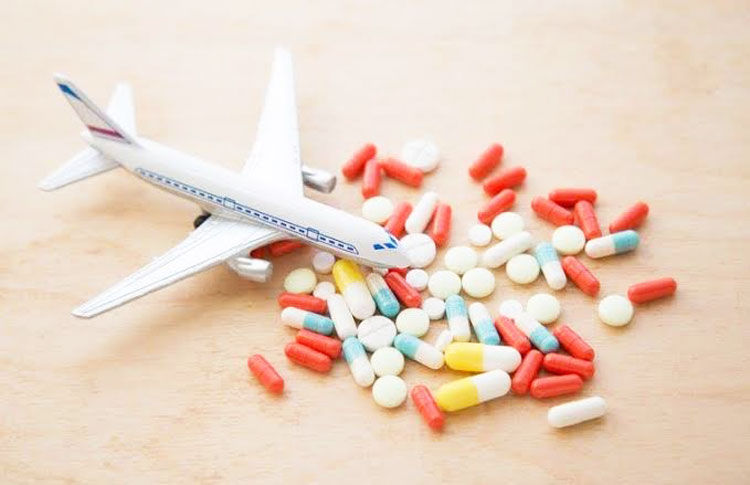
1) The Traveller’s Exemption, and how it will help you
The Traveller’s Exemption makes bringing medications into Australia easy and straightforward:
What is it? It allows travellers arriving by boat or plane to carry up to a three months’ supply of a personal drug (or ‘therapeutic good’) that has been prescribed by a medical practitioner.
What does it mean? Under the Traveller’s Exemption, as a foreign visitor you can bring any vital personal medication into Australia, as long as you do the following:
Arrive into Australia as a passenger on a ship or aircraft
Bring an official prescription, in English, from your home doctor. Make sure it specifically mentions the name of the drug and the dosage permitted, as well as the date it was prescribed.
Carry the medication in its original packaging, ideally with unbroken seals (including on pill packaging)
Carry no more than a three-month supply of the medication at its maximum dosage (again, be sure the dosage is noted on the doctor’s prescription)
How it works — If you follow these simple rules, there’s practically no need to worry about bringing personal medication into Australia, as most of them will be covered by this exemption.
However, just be sure to declare any medication upon arrival in Australia, as the penalties for failing to do this can be severe. Read on for more information about how and when to do this.
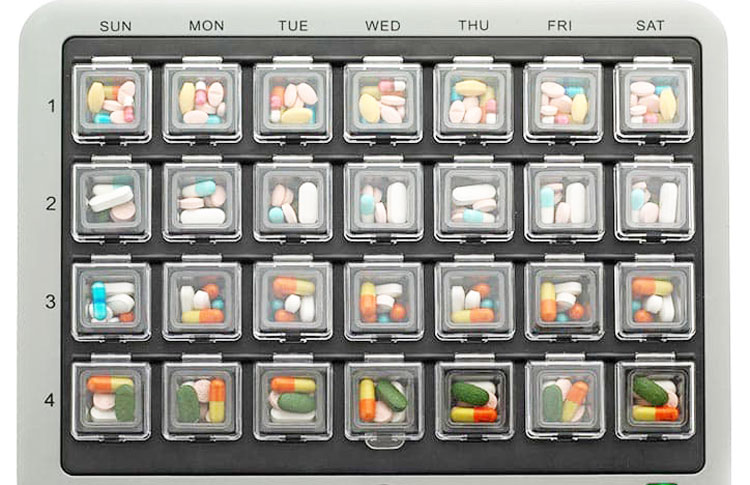
2) Common Prescription Medications covered by the Traveller's Exemption
Know your drug and your dose
From simple daily medication to illegal substances and illicit drugs, Australian biosecurity and border control deal with a broad range of substances coming into the country. They are very thorough in controlling the flow of medications arriving into the country... this means lots of checks at the airport.
So, knowing exactly what medications you have and what dosage you are bringing — plus having all required documents in order before you arrive — will save unnecessary delays at the airport.
Here are some common prescription medications, and the steps you can take to avoid any hassle when bringing them on holiday to Australia with you:
Bringing EpiPens, insulin, and asthma inhalers to Australia
Provided you can show the original packaging and (preferably) an official prescription or doctor’s note, in English, you should have no problem carrying personal injection devices or inhalers for the treatment of allergies, diabetes, asthma, and other common ailments.
Be aware: sportspeople (and their coaches, or anybody associated with an athlete) who carry inhalers containing steroids may need to attain special permission first. See below for further details!
Birth control/contraceptive pills in Australia
‘The Pill’ has been the source of plenty of debate in Australia over recent years, and it currently requires a prescription from your doctor.
It’s easy enough for travellers to obtain a prescription for birth control pills from a doctor while in Australia. However, if you want to avoid this hassle, or simply continue taking the same pill you do at home, then bring a prescription (or an official doctors’ note) from home.
Antidepressants you can bring
SSRIs (eg Prozac, Cipramil, Lustral)
SNRIs (eg Cymbalta, Yentreve, Effexor)
NASSAs (eg Zispin and other Noradrenaline and Specific Serotonergic Antidepressants)
Be aware: Some Tricyclic Antidepressants (TCAs) may be subject to restrictions. Check first with the Office of Drug Control (see below).
Hay fever medication you can bring
The following types of hay fever medication are covered under the traveller's exemption:
Claritin, Zyrtec, Alavert and other common hay fever pills
Prescription antihistamine nasal sprays such as Astelin, Astepro, and Patanase
Blood pressure medication you can bring
Calcium channel blockers, ACE inhibitors, Beta blockers, and other regulation blood pressure medications (including diuretics)
ADHD, anxiety, and stimulant medications you can bring
Ritalin, Concerta, and other methylphenidate medications
Adderall
Prescription Painkillers and Opioids you can bring include:
Morphine
Oxycodone
Methadone
Sedatives
Most commercially available benzodiazepines (a.k.a. “benzos”) are allowed, including all those containing:
Lorazepam
Diazepam, including Valium
Nitrazepam
Oxazepam
Hormones
Prescribed human growth hormones, whether manufactured or natural, may generally be brought into Australia under the Traveller’s Exemption. Some common hormone medications allowed under the Traveller’s Exemption include:
Human chorionic gonadotrophin (HCG) drugs
Somatotropin (HGH) drugs
Erythropoietin (EPO) drugs
Hormones that stimulate follicle growth
Luteinising hormones

Hey, sporty types: pay attention!
Athletes, managers, or anybody associated with an athlete who is carrying hormones MUST obtain a permit from the Office of Drug Control before arrival. This stipulation also applies to travellers with steroids (See below).
Herbal remedies, dietary supplements, and plant-derived medications
There is no specific legislation banning bringing herbal remedies and alternative therapeutic medications into Australia. However, particular products may be disallowed, or require special permission, because they contain ingredients which are unregulated or illegal in Australia — for example, medicinal cannabis products (read on for further details) and any weight-loss medications derived from Hoodia.
More commonly, herbal remedies and plant-based medications only cause problems as a biosecurity hazard, rather than an illicit or illegal drug.
Plant-based natural remedies
Australia has strict biosecurity regulations which demand that ANY food, plant and animal products must be declared on arrival, including herbal and natural medications. This is standard procedure (outlined below), and as long as you write it on your Incoming Passenger Card, this should be a breeze.
Dietary supplements and vitamins
Depending on what they’re made from, vitamin tablets, natural dietary supplements and any herbal remedies may be considered a threat to biosecurity if Australian Border Force authorities can’t determine exactly what’s in them.Therefore, it’s important that you can show exactly what ingredients are in these products.
For this reason, it’s good to have them in their original packaging, ideally in English. Unlabelled dietary supplements or pills may be confiscated.
Know it, show it
As long as you know and can show what ingredients your herbal remedies or dietary supplements are made from, they should cause no problem at all.
For more information on what natural products are allowed and which are not allowed to be brought into Australia, visit the governmental Department of the Environment and Energy website.
So we've covered the medications you are likely to have no trouble bringing for your Australia vacation (with a valid prescription of course).
But what about the medications you can't bring?

What medication can I NOT bring into Australia?
In addition to any disallowed natural plant or animal products for biosecurity reasons, some personal prescription medications cannot be brought into Australia (even if accompanied by an official prescription and doctor’s note).
These include:
Steroids
Steroids (technically defined as androgenic and anabolic substances) have some special regulations in Australia.
Steroid advice for regular travellers
If you are carrying prescription drugs containing steroids, whether consciously or not — note that some health supplements which claim to encourage muscle or bone growth commonly contain steroids, so it’s wise to check — you will need to declare them. In some cases you will also need special permission through the Therapeutic Goods Association Special Access Scheme (SAS), which you can apply for in advance via email.
Still, you should be allowed to bring in prescription medication containing steroids, provided you meet the other requirements for the Traveller’s Exemption:
you arrive into Australia as a passenger on a ship or aircraft
you have the medicines in your carry-on rather than checked baggage
you present a valid prescription/doctor’s letter
you have no more than a three-month supply
Like all other medications, you must declare these on your Incoming Passenger Card before presenting to the customs officer.
However, not everybody can bring in steroids:
Steroid advice for athletes and people associated with athletes
Peptides, hormones, and all androgenic or anabolic substances carry regulations especially relevant for athletes or medical staff in Australia.
As a general rule, anybody playing or planning on playing competitive sport while in Australia, whether professional or amateur, cannot bring steroids into Australia. Even if they meet the requirements for the Traveller’s Exemption. This also extends to any people associated with sports competitors (including coaches, managers, family members, et cetera).
To find out whether you can obtain a permit for bringing medication containing steroids into Australia, contact the Special Access Scheme (SAS) directly and seek approval before arrival.
Medicinal marijuana and cannabis products
Although medicinal marijuana and cannabis products can technically be brought into Australia under the Traveller’s Exemption, they fall under ‘controlled substances’ by Australian law. That generally means they cannot be brought in by temporary visitors, but only by licensed importers.
Recreational use of marijuana: special warning for US travellers
While recreational marijuana and cannabis products are legal in some US states, any substance brought into Australia for recreational use will be treated as an illicit drug and fall under Australian narcotic possession laws, which vary from state to state.
It’s not worth the risk bringing them in, even if they have been legally purchased in the US or elsewhere.
Obtaining medicinal cannabis while in Australia
Regulations allowing medicinal marijuana and cannabis-based products have existed in Australia for several years, and the cultivation of cannabis for medicinal research has been allowed in Australia since 2016.
There is also a steady supply of medicinal cannabis products from abroad, thanks to relatively favourable import laws.
However, the process for obtaining a prescription for medicinal cannabis products from an Australian doctor can be tedious — especially for foreign visitors.
By law, in order to be prescribed a cannabis-based medicinal product, patients must make an appointment with a specialist doctor (rather than a General Practitioner or family doctor), and then wait for up to several weeks for government approval. Under the Customs Act 1901, The doctor has to be specifically licensed to prescribe that specific medicinal cannabis product, on behalf of one specific patient, through the Therapeutic Goods Act’s Special Access Schemes A and B. You’ll have to apply by submitting a form through the Office of Drug Control.
In other words — it’s possible to obtain unregistered medicinal cannabis products in Australia, but it will probably take a lot of time and money.
Permitted medications that require special permission
Even under the Traveller’s Exemption and with a valid doctor’s letter or prescription, it is necessary to acquire special permission to bring in certain medications.
The following medications are allowed, but they must be cleared off with the governmental Drug Control Section at DCS@health.gov.au before arrival:
Mifepristone and other abortifacients
Yohimbine and other aphrodisiacs or products to treat erectile dysfunction derived from Yohimbe
Aminophenazone, amidopyrine, and aminopyrine (for treatment of pain, rheumatism and common colds)
Amygdalin (a.k.a. laetrile), which is also referred to as ‘Vitamin B17’
In addition, Clexane, Hizentra, and any other injections containing material derived from humans or animal products must be cleared off with the Australian Therapeutic Goods Administration before arrival. You can do this through an Australian doctor using the TGA’s Special Access Scheme.
Note that insulin injections for diabetics are allowed without special permission.
Changes in codeine medication regulation
Until 2018, any personal medications containing codeine could be brought into Australia without a prescription.
However, since new legislation came into force in February 2018, travellers arriving in Australia carrying codeine medication — regardless of strength or dosage — need to have a detailed prescription or doctor’s note when they declare it.
So make sure you check the ingredients on your cough medicine before you slip it into your carry-on.
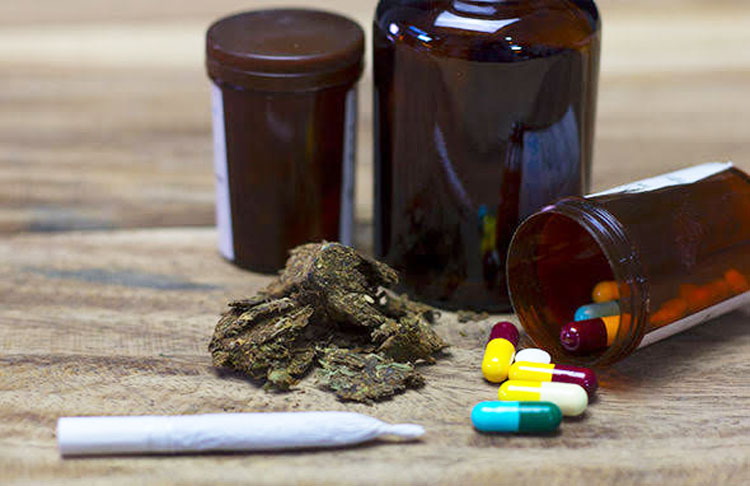
Handy hints for smart travellers bringing medication into Australia
Get sorted before you go
Any travellers planning on bringing medication into Australia should start planning when they pack.
Read next: What to pack for an Australian holiday
Packing medications
As much as possible, obtain original packaging and detailed ingredient lists for any medication you plan on bringing with you.
Be sure to pack any medications you plan to declare into your carry-on or accompanied luggage, not your check-in bags.
Get as much official supporting documentation in English as you can. Medicinal information translated into English and signed off by a medical professional may be more helpful than a lot of information in a foreign language.
Check your visa and immigration status
The Traveller’s Exemption applies to international visitors and returning Australian residents. If you fall outside these categories — for example, some temporary workers— you may need to show additional proof that you will be leaving the country within a specified time period (for example, a return flight confirmation or a cruise ship itinerary).
Our guide to Australian passport and visa requirements
How to declare medications when arriving into Australia
Fill in your Incoming Passenger Card honestly and correctly
All passengers arriving into Australia will have to fill in and present an Incoming Passenger Card at border control and customs. These are usually handed out by crew on board incoming flights and ships, or available in the arrivals hall just before passport control.
This is a legally binding document, and you MUST declare any and all medication you have on this form. There could be dire consequences if not. In the worst case:
A fine of over AUD$400,000
Deportation or visa cancellation
Up to 10 years imprisonment
But don’t stress — just declare it!
Despite the severe penalties, don’t be alarmed — under the Biosecurity Act 2015, travellers cannot be penalised for any substances they carry (even if they are not allowed) as long as they declare them on their Incoming Passenger Card.
Don’t lose your visa — Since April 2019, airport authorities in Australia have the legal right to shorten or cancel travellers’ visas if they discover any medication, food, and other plant or animal products in passengers’ baggage (whether check-in or carry-on) that has not been declared on your Incoming Passenger Card.
Don’t get held up — Even the smallest, most nondescript medication can cause annoying delays at the airport if authorities find it in your bags and it hasn’t been declared. In this case, you’ll likely:
Be pulled aside and asked many questions
Get asked to unpack your luggage
Have to undergo some kind of swab test or, in some cases, a chemical lab analysis.
Don’t risk it — Airport authorities can legally ask to inspect your baggage at any time, not only when passing through biosecurity or presenting your Incoming Passenger Card to Border Force staff. You may be asked to put your bag through an X-ray machine or be inspected by sniffer dogs, and it’s not worth the risk of trying to squeeze through with undeclared medicines.
In short — declare it, show it, forget about it.
More need-to-know facts about visiting Australia
Know where and how to get more medication if you run out while in Australia
Depending how long your trip to Australia will be, you may need to top up medications while in the country. If that happens, here’s what you can do:
First, go to a doctor to talk about your options and see if it’s possible to obtain a further supply locally.
If the medication you need is not currently registered in Australia (for example, Adderall), then you’ll need to contact the Drug Control Section directly about possible exemptions or alternatives. Note that there is absolutely no guarantee that you’ll be able to procure the medication in this case.
Further reading: what to do if you have an accident in Australia
Applying for exemptions
To reiterate what we covered above, here are the authorities to whom you should apply for any exemptions and licenses for medicines that are not covered by the Travellers’ Exception:
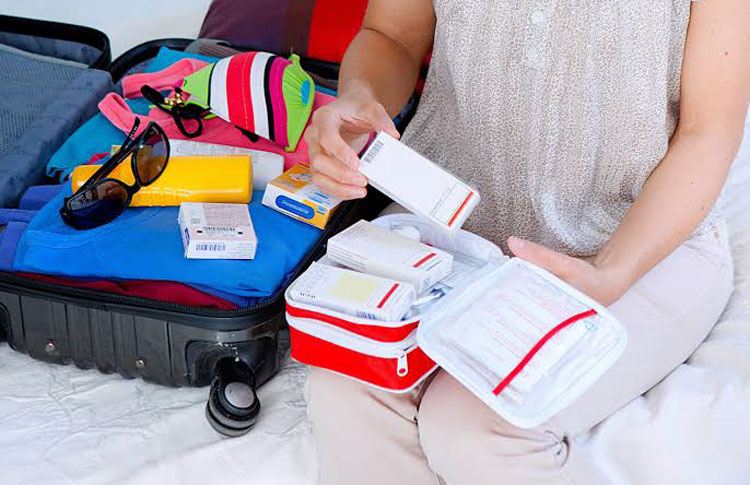
In summary: be honest, be aware, and declare
The steps for bringing medication into Australia are straightforward and stress-free, provided you follow them correctly.
To summarise what we’ve talked about, here it is again:
Bring any prescribed, personal medication from your home country in its original packaging with an official prescription or written authority from a medical professional.
Declare any and all medication (whether prescription medicines or natural therapeutic remedies) on your Incoming Passenger Card
Visit a local doctor to know your options for obtaining further supplies while in Australia.
To find out more about bringing medication into Australia, check out the outline provided for travellers on the Therapeutic Goods Administration website.
You can also use First Light Travel’s totally free, no-obligation itinerary-planning service: we can help you with travelling in Australia with a medical condition, tailoring your itinerary to include accommodation near hospitals or clinics, and visiting Australia’s world-class attractions with an illness or disability.
Recent Posts
Blog Categories
Blog archives
- March 2025 (1)
- November 2024 (1)
- October 2024 (1)
- September 2024 (8)
- June 2024 (4)
- May 2024 (2)
- April 2024 (2)
- March 2024 (13)
- February 2024 (3)
- January 2024 (5)
- December 2023 (6)
- November 2023 (4)
- October 2023 (11)
- September 2023 (2)
- August 2023 (6)
- July 2023 (2)
- June 2023 (17)
- May 2023 (3)
- April 2023 (5)
- March 2023 (8)
- February 2023 (9)
- January 2023 (12)
- December 2022 (9)
- November 2022 (12)
- October 2022 (12)
- September 2022 (12)
- August 2022 (6)
- July 2022 (9)
- June 2022 (7)
- May 2022 (3)
- April 2022 (4)
- March 2022 (6)
- February 2022 (1)
- January 2022 (4)
- December 2021 (2)
- November 2021 (3)
- October 2021 (1)
- September 2021 (4)
- August 2021 (10)
- July 2021 (13)
- June 2021 (6)
- April 2021 (2)
- March 2021 (2)
- February 2021 (1)
- January 2021 (1)
- December 2020 (2)
- November 2020 (3)
- October 2020 (2)
- September 2020 (1)
- August 2020 (1)
- July 2020 (1)
- June 2020 (1)
- May 2020 (1)
- March 2020 (1)
- February 2020 (2)
- January 2020 (4)
- December 2019 (2)
- November 2019 (1)
- October 2019 (1)
- September 2019 (5)
- August 2019 (1)
- July 2019 (5)
- June 2019 (1)
- May 2019 (1)
- April 2019 (1)
- March 2019 (1)
- February 2019 (1)
- January 2019 (1)
- December 2018 (1)
- October 2018 (1)
- May 2018 (1)
- February 2018 (1)
- December 2017 (1)
- October 2017 (1)
- June 2017 (1)
- May 2017 (1)
- February 2017 (1)
- January 2017 (1)
- September 2016 (1)
- August 2016 (2)
- July 2016 (1)
- June 2016 (1)
- May 2016 (1)
- April 2016 (1)
- December 2015 (1)


